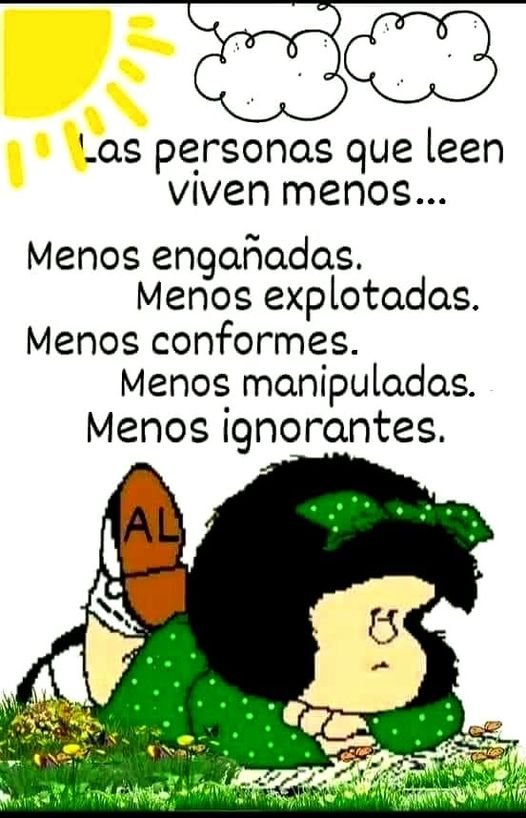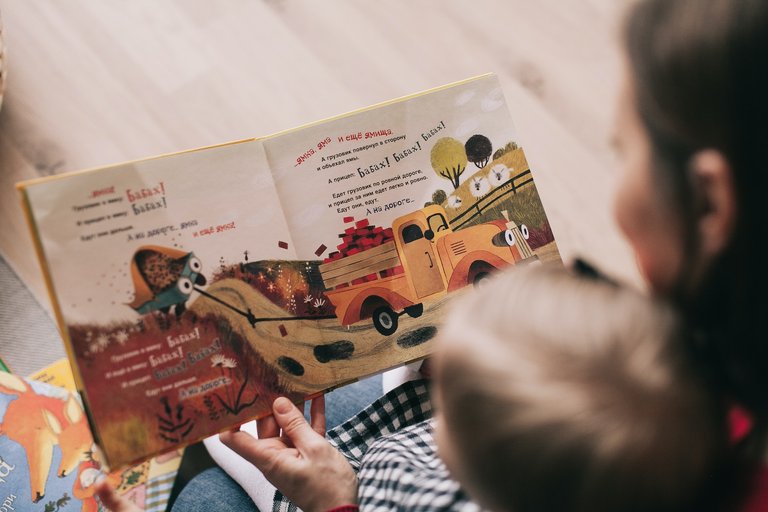
Yesterday, while reading my first book of September, Elena Armas's The Long Game, in brief: a disgraced football executive is forced to enlist the help of a retired football star to coach a children's team in this small-town love story in the vein of Ted Lasso and It Happened One Summer, by the New York Times bestselling author of The Spanish Love Hoax. My son, Matthew, was reading presentations sent to him by his cousins from Venezuela -in Spanish-, and one sentence caught his attention…
— Daddy, why do they say that “people who read live less…”?
He took the tablet Matthew was manipulating and if that was indeed what the first sentence of a meme said, further down it read:
- ... less deluded,
- ... less exploited,
- ... less compliant,
- ... less manipulated,
- ... less ignored...
It amazes me that among children between the ages of 7 and 9 years old, these pictures are passed around when they don't even have the capacity to reason the message implicit in them. I show you the original print that the child received.

Talking to my son about the meme, I could understand the concern he felt when he read the first sentence. “If my daddy reads one or two books a month, will he die? Will he live less?”, of course, that worried him a lot, maybe if he had finished reading the rest of the picture, his impression would be different…
Reading is understanding, and reading is always done in order to understand, otherwise it would be meaningless. A reader understands a text when he/she can find meaning in it, when he/she can relate it to what he/she already knows and what interests him/her. Comprehension is therefore closely linked to the vision that each person has of the world and of him/herself, therefore, when faced with the same text, we cannot claim a single, objective interpretation. The reader will give meaning to a reading by coordinating information from different sources: the text, its context and the knowledge he or she possesses.
Reading comprehension proper
At this stage, the reader will use strategies aimed at analysing the text and its overall meaning, for which he/she will carry out several activities simultaneously:
- distinguishing main ideas from secondary ideas
- relate meanings
- organising sequences
- recognise anaphoric relationships (relating certain paragraphs or concepts to what has been said earlier in the text) or cataphorics relationships (relating concepts to what will be mentioned later)
- distinguish between figurative and real facts, analyse the author's intentions.

The main difficulties encountered at this stage are related to unfamiliarity with the lexis used by the author, lack of prior knowledge of the subject, or lack of motivation. Worse still, when the content of a meme plays on the reader's everyday experience.
Levels of reading comprehension
In the comprehension process, different operations are carried out, which can be classified into the following levels:
Literal comprehension, where the information explicitly stated in the text is retrieved and reorganised by means of classifications, summaries and syntheses,
Inferential comprehension, which allows, using the data explicitly stated in the text, plus personal experiences and intuition, to make conjectures or hypotheses;
Critical comprehension, through which evaluative judgements are made;
Appreciative comprehension, which represents the emotional or aesthetic response to what is read.
It is undoubtedly during comprehension that the reader interacts with the text he or she is reading and is able to make that linkage we mentioned, and this is important to clarify because not always when reading, a person manages to decipher or understand the message in question. Or even, in some cases, after reading, the person may misunderstand the message in question.
The text can be understood in different ways: literally, only by understanding the data that is explicitly stated; critically, which involves making judgements about the values presented in the text; and inferentially, which involves reading between the lines of what is proposed in the text, i.e. understanding what is meant, even if this is not done hastily, that it is not done in an expository and explicit way.
We know that all writing, whatever its length, provides us with explicit and implicit information, depending on the author's intended purpose.
Inferring facts—Inferential Level
We look for relationships that go beyond what we have read, we explain the text more broadly, adding information and previous experiences, relating what we have read to our previous knowledge, formulating hypotheses and new ideas. The goal of the inferential level will be to draw conclusions. This level of comprehension is rarely practised at school, as it requires a considerable degree of abstraction on the part of the reader. It favours the relationship with other fields of knowledge and the integration of new knowledge into a whole.

In this sense, and with the information provided, it is logical for my son Matthew to have inferred that his father, i.e. me, would live less by reading so much. His short experience, his age and not having read the whole context, caused him to err in conclusions.
- Inferring additional details, which, according to the reader's conjecture, could have been included in the text to make it more informative, interesting and convincing;
- Inferring main ideas, not explicitly included;
- Inferring sequences, about actions that might have occurred if the text had ended differently;
- Inferring cause and effect relationships, hypothesising about motivations or characters and their relationships in time and place. Conjectures can be made about the causes that induced the author to include certain ideas, words, characterisations, actions;
- Predicting events on the basis of an unfinished reading, deliberately or not;
- Interpreting figurative language, to infer the literal meaning of a text.
The ideas contained in a text are not put together by chance, the author has given them a certain order and established relationships that help us to understand the message. And has established relationships that help us to understand the message. Consequently, it is of utmost importance to cultivate the ability to relate the ideas set out in a text to each other.
Analogies between words
The term analogy comes from the Greek and means the relationship of similarity or comparison between two things that are different. This means that when two elements or principles are associated by their properties, both general and individual, we are talking about analogy. Analogy makes it possible to carry out reasoning of an inductive nature, since if it is determined that two or more elements are similar, it is very likely that more similarities will be found between them. Analogies are deductions that are made on the basis of the similarity in some quality of two elements, changing between them properties that are not precisely identical.
This process of analogy is acquired by a child from the moment he or she is able to interpret speech and utter his or her first words. The process is extended over the years, with experience, with practice, with reading, with music. Hence, the first years of a child's learning are important, because they are “like sponges” that absorb everything; it will depend on us -their parents- and the teachers at school, with what information we flood them with.

Finally, here are some typical analogies that a fourth grader should be able to handle with ease:
- Television is watching as radio is too listening.
- An angel is too good, as the devil is to evil.
- Hunger is to food as thirst is to drink.
- Madrid is to Spain what Paris is to France.
- Tear is to sadness as smile is to happiness.
- Crying is to sadness as laughing is to joy.
- Hot is too cold, as light is to darkness.
- Paint is to paintbrush as music is to instruments.
- A fin is to fish, as a hand is too human.
- A ruler is to geometry, as a fork is too cooking.
- A lion is to jungle as a shark is to ocean.
- A book is to a writer, what a record is to a musician.
- Sitting is to chair as lying down is to bed.
- Monday is to the week, what January is to the year.
- Erasing is to rubber as writing is to pencil.
But this one is not…:
- Germany is to beer as France is to wine.
****🔆****🔆****🔆****🔆****🔆****🔆****🔆****🔆****🔆****🔆****🔆****
Credits
Images: 1. 2. 3, 4
Title art: Cooltext

I can imagine the look of consternation on the child's face, and no wonder. In our times, people read a lot, but the reading they do on cell phones, tablets and computers does little to develop comprehension.
Short texts are being imposed to satisfy a generation that pays little attention and has trouble concentrating, and even publishers are pressuring authors to keep their books short. Thank you for these reflections, dear @amigoponc . A big hug from Maracay.
I've wanted to take pictures of their expressions, and post one or two, but I've held back. His autism is a potential amplifier of all his senses.
Matthew is learning to get by in three languages, his mother is French, I am Venezuelan and because of school, he has to be able to speak English. It took me a while, of course, because of his age, but it has become very easy for him.
My nephew, who studies fourth grade in a Fe y Alegria school, showed me his books, which were given to him in a so-called state school bag, and I silently regretted the poor quality of the material, the leftist content and the poor handling of the contents… Education in my beloved country has collapsed. By the way, my niece Gilda was selected via OPSU to study law at the UCV, my home of study…
Thank you for sharing your response to my publication. A hug from afar.
For a child to grow up speaking three languages is a blessing.
It is very unfortunate the current situation of public education in our country, primary and high school are in ruins. I am happy for your niece, the UCV still retains some of the mystique of other times. Have a nice evening.